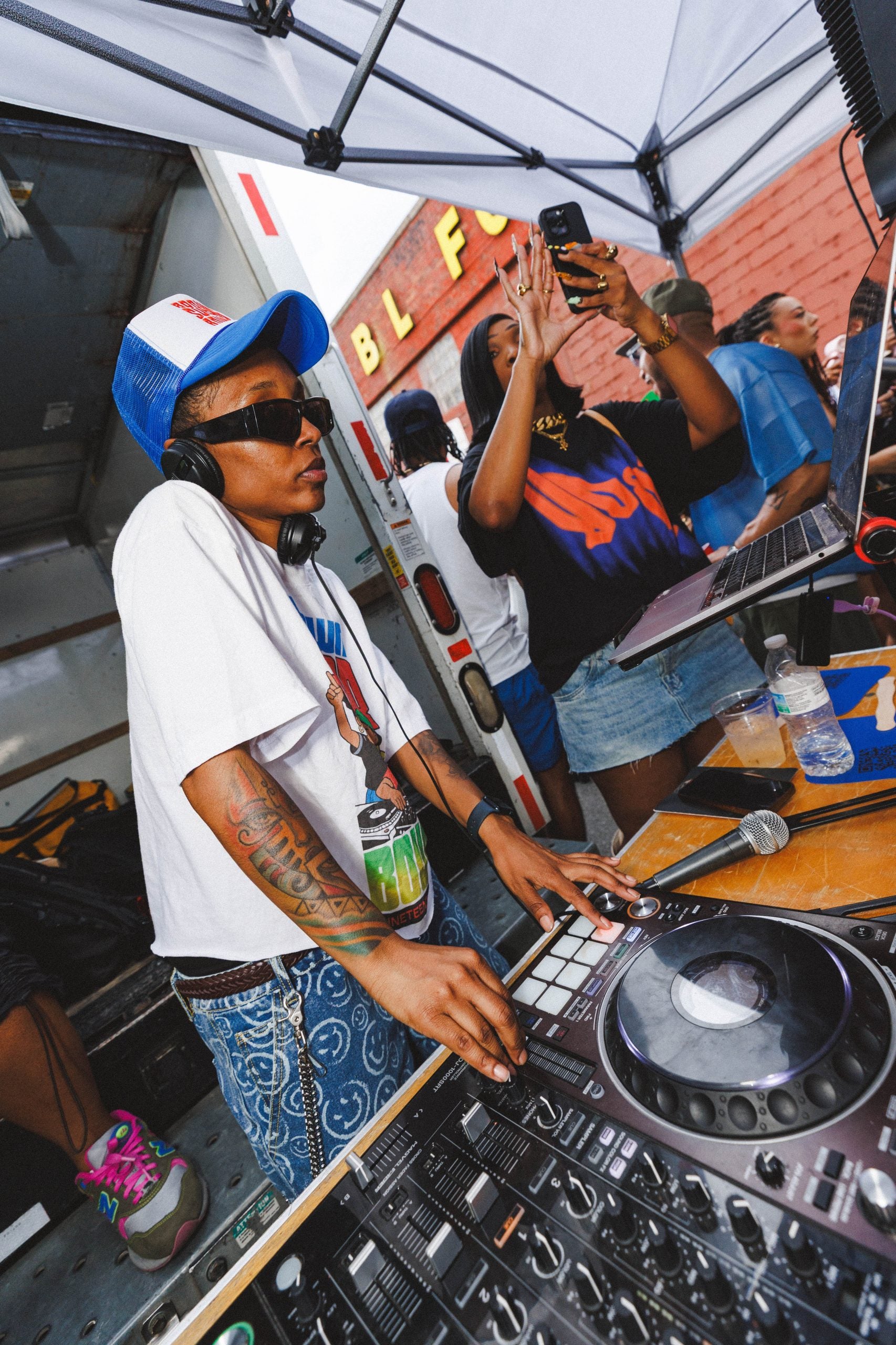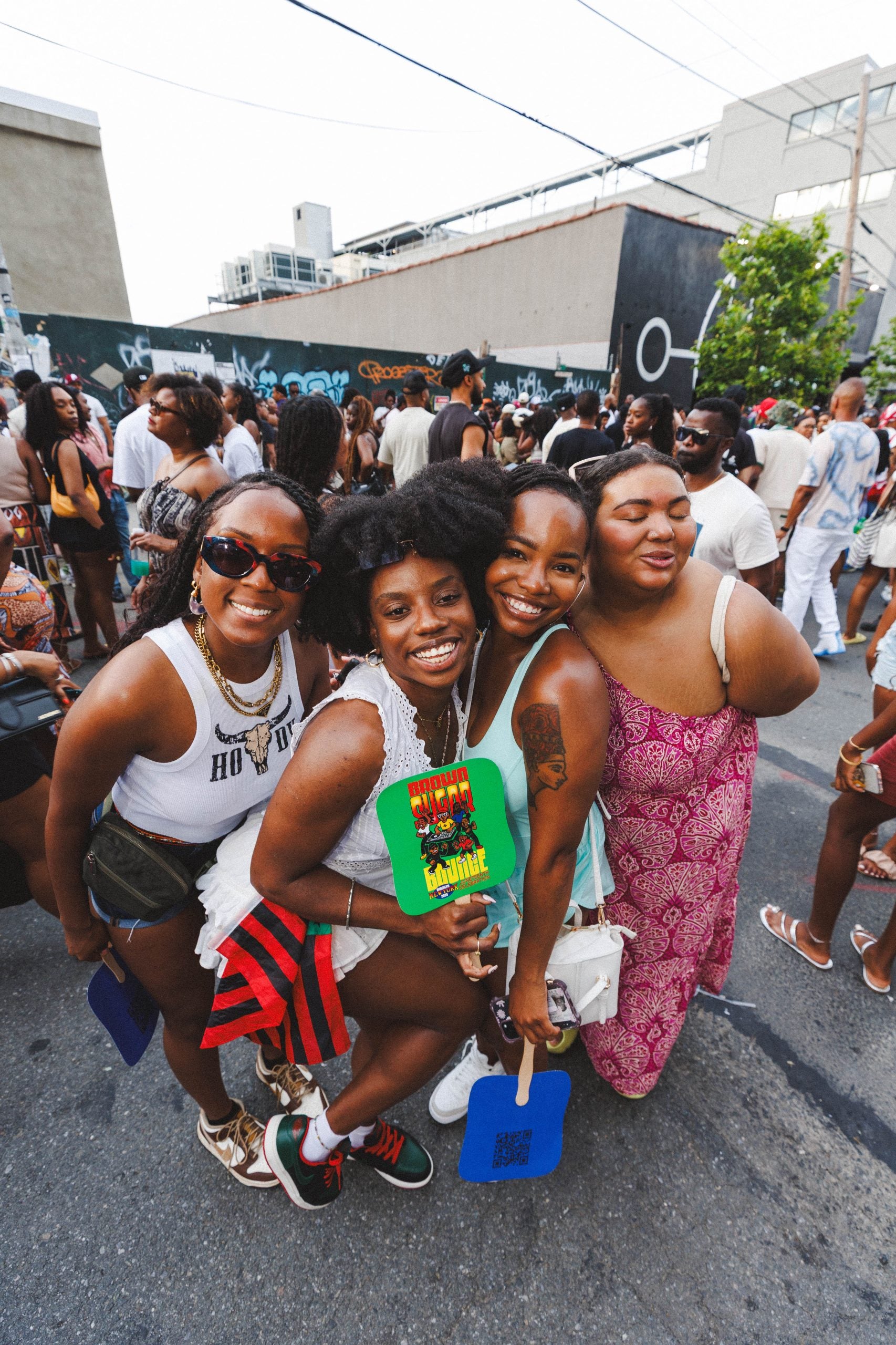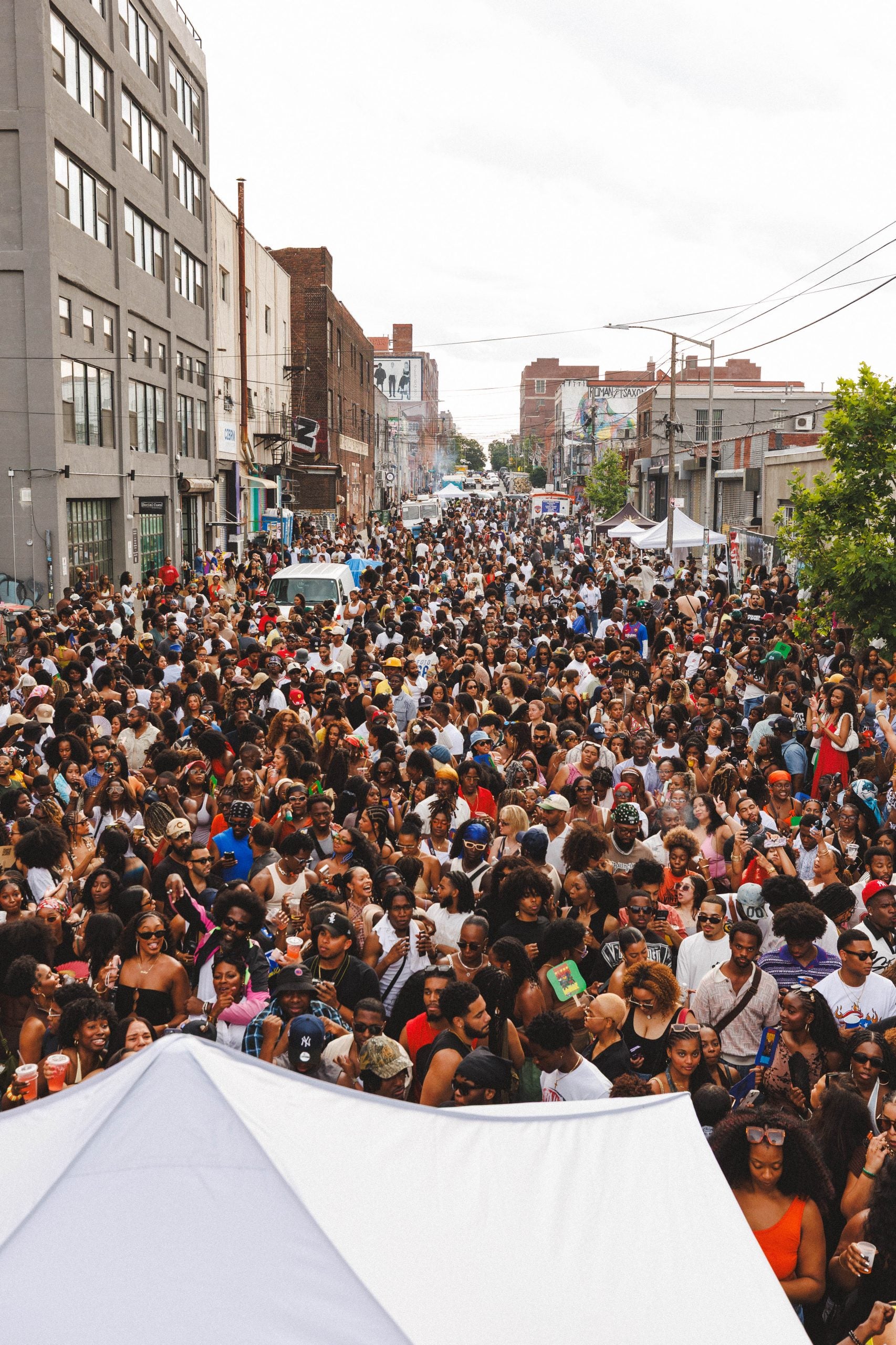A sea of partygoers found themselves in a harmonious sync, singing and electric sliding to Beyoncé’s rendition of “Before I Let Go” on Meserole Street in Brooklyn, New York, on Saturday afternoon. Looking cucumber cool on a 90-degree day as they donned cropped jerseys, vintage concert tees, cool baggy pants, Savant Studios bucket hats, Western boots, grillz, and fresh acrylic sets, the crowd at Brown Sugar Bounce Block Party was an expressive culmination of Blackness.
“I really could shed a tear every time I see us. We look so good,” attendee Brittony McKenney said, emphasizing how Black women specifically showed up to the block party. “You see all of these Black bodies, and they’re different. I just picture them as silhouettes, and everybody’s so textured.”
Not only was this the first official weekend of the summer, but it was Juneteenth weekend. For just about an entire week, events like Brown Sugar Bounce, South House, The Soapbox Stoop Sessions, and The Lay Out cultivated spaces for Black New Yorkers to experience joy, community, and a reprieve from the world’s chaos. For many, rocking garments and accessories that reflect the richness of Black history while moving in rhythm to the soundtracks of the holiday’s celebration was not just a necessary reprieve, but a spiritual embrace.

“Before going to church every Sunday, my dad used to say, ‘Come on, let’s go get full,’” said Alexis “ClassicNewWave” Toney, DJ and founder of Brown Sugar Bounce. “And that’s the same way I feel about The Bounce. When people come, I want them to get spiritually full.”
This year’s Juneteenth celebration came at a peculiar, yet all too familiar time in history. As federal and corporate entities are blatantly telling anyone who isn’t either white, male, or heterosexual that they don’t care about their identities, they are still co-opting and profiting off of Black culture. Just five years ago, when Juneteenth became a federal holiday in the wake of Black Lives Matter protests, the same entities were posting black squares on Instagram and vowing to fight inequality. Now as the Trump administration works to erase Black history in schools, libraries and beyond, communal Black expression is 2025’s weapon of choice in the pursuit of liberation.
Communal Expressions Through Parties
From Harlem to Brooklyn, New York City was filled with the sounds of Blackness. Jazz, hip-hop, R&B, and dance music filled venues, rooftops, and stoops alike. Not only was it Juneteenth weekend, but it was Black Music Month and Pride Month.
Juneteenth was first celebrated in Galveston, Texas, in 1865 when Gen. Gordon Granger and his troops told the last enslaved Black people that they were free, two and a half years after President Abraham Lincoln signed the Emancipation Proclamation. Since then, Texas has been the epicenter and blueprint for Juneteenth celebrations. For generations, parades, pageants, musical performances, and educational programming have become the norm for the state’s holiday.

As more celebrations spread throughout the south and, more recently, the East Coast, folks have become more intentional about honoring the day. This year felt especially important as more and more Black establishments in the city shutter due to rising costs, noise complaints, and gentrification.
Steven Barter, founder of the clothing line Barriers, usually uses Juneteenth to rest. This year, however, he found it necessary to build on Barrier’s mission to educate and honor Black history. His nonprofit partnered with Awake NY and Thrift 2 Death for a free block party and thrifting event featuring screenprinting, grillmaking, and DJ sets.
“[I want to] use this other vehicle to tell our stories from the past, but also to raise awareness of what’s going on in everyday life,” Barter said. “A lot of the stuff that our heroes were talking about is still relatable today.”
His shirts and hoodies feature images and quotes from figures like Malcolm X, Duke Ellington, Muhammad Ali, 2Pac, among many others. For Barter, purposeful fashion isn’t just expressive, it can be a form of protest.

“Back in the day, they made posters,” Barter said during a Zoom call. “The T-shirt is the new poster to get messages across to different people. In fashion, it’s going to keep growing.”
Tochi Ukwu, founder of clothing line Southern Yankee, uses his parties, including South House as a community hub for southern music, fashion, and culture to thrive on the East Coast. This past weekend’s South House parties took place in Brooklyn and Chicago.
At South House, you’ll see fly folks in Black-owned apparel and outfits that give a nod to the ‘80s, ‘90s, and early aughts. It’s not a throwback-themed party, but the nostalgic energy partygoers have bleeds into the DJ sets with speakers blasting with subgenres of Southern hip-hop that stem from the past few decades into today’s hits. Ukwu emphasized Black America’s global influence and also parties like South House as an epicenter for expression.

“Who are the masters of expression? Black people,” he said matter-of-factly. “It’s the magic that makes the world go round. We do that through lingo. We do that through style, we do that through dance, we do that through words. We do that through just existing. So it’s like that’s just another tool of the magic that makes it all happen. That style, whether it’s jerseys, whether it’s tees, it don’t go until we put it on.”
In Community By Any Means
The day before Juneteenth, the NYPD called Toney, informing her that they were shutting down Brown Sugar Bounce Block Party before it even started.
“Another group found out that I had a street permit and decided that they wanted to throw their own block party,” Toney said. With rising anxieties around where Black New Yorkers can freely gather comes a pressure for organizers. So when Toney won the fight to save this year’s Bounce, which was their biggest Juneteenth celebration yet, she knew that there was an even bigger purpose at stake.
Toney expressed that as a masculine-presenting queer woman, it’s important for her to be able to create spaces that people feel comfortable in. “I’m trying to bring that family reunion vibe. I was raised in love, and so that’s the same thing I try to [create] with the Bounce.”
Though Toney, Barter, and Ukwu threw different Juneteenth celebrations, the common thread they share is the impact that they believe can come from community coming together, even when external forces try to prevent that from happening.

Kwynn Butts, Toney’s manager, has been living in New York for nearly 11 years and knows how draining trying to make it can be. “I don’t want to make partying sound profound, but [we’re] working really hard day-to-day,” she said. Butts adds that many of us need the other side of the spectrum: relaxing and letting loose which can be profound.
As folks were enjoying their Juneteenth weekends, push notifications flooded phones reading that President Donald Trump fired missiles against Iran. It was yet another thing on top of the piling of things going wrong in the world.
If you looked on the surface at the crowd dancing, playing Uno, and waving fans and flags on Meserole Street, you’d think they didn’t know or didn’t care. That couldn’t be further from the truth. Among each other, in this space, they were thriving in the midst of a chaotic world that has taken so much from them. They were covered in a joy that can only be felt and not explained. And, as McKenney said, they were adorned with clothing that mimicked armour so they can keep going.
In McKenney’s own words: “Juneteenth is a moment in time for us all to archive who we are in the space that we take up and how we show up.” She went on to express that the archival reflection is not just from an aesthetic point of view, but rather a political one and a personal one.” I’m very proud of who we are, what we have, and what we’ve been able to preserve given all the things that we’ve experienced. It’s a reclamation of self, of who we are, of what we stand for and what’s to come,” she added.
